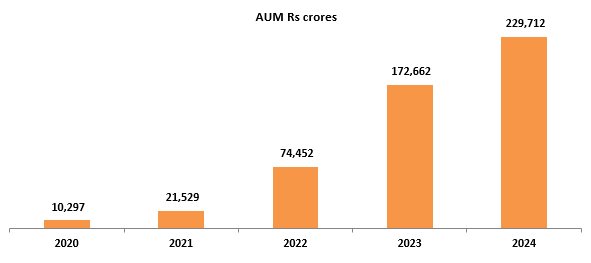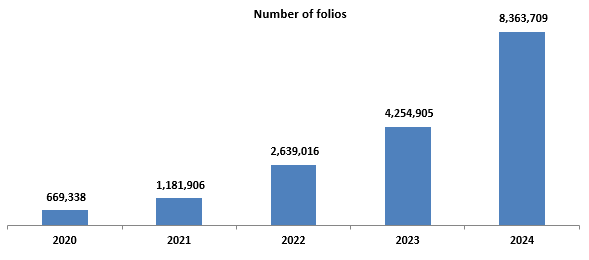Importance of investing in factor based Index Funds

Index funds have been growing in popularity in India over the past few years. Investor interest in index funds started growing after the outbreak of COVID-19 pandemic and we have seen huge growth in assets under management (AUM) over the last 4 years. Though passive funds have attracted the interest of many retail investors, most investors still associate passive investments with investing in Nifty or Sensex. In this article we will discuss about factor based index funds, which have the potential of generating higher returns than the frontline indices.
Rising popularity of Index Funds
In the last 5 years AUM in Index funds grew by 22X from around Rs 10,000 crores to Rs 2.3 lakh crores (see the chart below).

Source: AMFI, as on 31st May 2024
The number of folios multiplied by 14X in the last 5 years (see the chart below). Many of these investors are first time or young investors, who began investing in mutual funds after the first outbreak of COVID – 19 pandemic.

Source: AMFI, as on 31st May 2024
Factor based index funds are relatively new – the first factor based index fund was launched in late 2021. Factor based index funds are popular in developed markets – factor based or smart beta ETF AUM in the US is USD 2 trillion out of total ETF AUM of USD 10 trillion. Compared to the US, factor based index funds have not yet been able to attract that much investor interest. However, the time is ripe for factor based index funds to take off in a big way in India also.
What are factor indices?
Factor indices are constructed based on quantitative, rule based investment strategies based on factors which historically driven portfolio returns and risk. Factor indices are also known as strategy indices or smart beta indices – you should be aware that these names can be used interchangeably. Factor indices select stocks from the constituents of a certain benchmark index like Nifty 50, Nifty 100, Nifty 200, Nifty 500 etc based on certain factors like Volatility, Beta, Alpha, Dividend Yield, Value, and Quality etc. Factor indices can be of two types:-
- Single factor indices – In these indices stocks are selected from a certain investment universe e.g. Nifty 50, Nifty 200, Nifty 500 etc based on a single factor. For example, the Nifty 100 Low Volatility 30 index tracks the performance of 30 stocks in Nifty 100 with the lowest volatility in last one year.
- Multi factor indices - In these indices stocks are selected from a certain investment universe based on multiple factors. For example, the Nifty Alpha Low Volatility 30 index tracks the performance of 30 stocks selected based on the top combination of Alpha and Low Volatility (both high alpha and low volatility) from the Nifty 100 and Nifty Midcap 50 indices.
What are the different factors used in factor based indices?
Here are some of the factors that are used in factor based indices or strategy indices. Please note that this is not an exhaustive list of factors used in strategy indices. Our objective in this blog post is to give you a sense of the factors that can lead to superior performance or lower risk.
- Momentum – Momentum refers trend in share price movement, upwards or downwards. It is measured in terms of 6 and 12 months returns adjusted for volatility.
- Volatility – Volatility refers to the deviation in returns from the average. Low volatility index selects stocks with the lowest volatility.
- Quality – Quality refers to performance of a stock on parameters like return on equity (ROE), leverage (debt / equity ratio) and average change in Earnings per share. Stocks with high scores on these parameters are high quality stocks.
- Alpha – Alpha is the excess return (outperformance) of a portfolio of stocks adjusted for risk (beta) relative to the market index return. Alpha is a measure of risk adjusted returns.
- Beta: Beta is the movement in price of a stock relative to the movement in market index. For example, if the beta of a stock is 1.2, then for every 1% rise in the market index, the share price will rise by 1.2% and for every 1% fall in the market index, the share price will fall by 1%. Beta is a measure of risk. A high beta will outperform in rising markets and underperform in falling markets
- Dividend yield: Dividend yield is the annual dividend paid by the stock divided by the share price. Suppose the share price of a company is Rs 100 and the company declares a dividend of Rs 10. The dividend yield will be Rs 10 ÷ 100 = 10%. High dividend risk is usually a sign of lower risk.
- Value: Value stocks refer to companies which may be trading at significant discounts to their intrinsic or fair valuation. Value stocks are selected on the basis of Return on Capital Employed (ROCE), Price-Earnings (PE), Price-Book Value (PB) and Dividend yield.
As mentioned earlier, single factor indices selects stocks based on one of the factors mentioned above. There can be different indices for the same factor depending on the investment universe and the strategy. For example, Nifty 100 Alpha 30 index selects 30 stocks with highest alpha from the Nifty 100 stocks (100 largest stocks by market capitalization in the NSE), while Nifty 200 Alpha 30 index selects 30 stocks with highest alpha from the Nifty 200 stocks (200 largest stocks, both large and midcap by market capitalization in the NSE). Multi factor indices, on the other hand, selects stocks based on multiple (more than one) factors.
You may also like to read how to select the right Index Funds for your portfolio
Why you should look at factor based index funds?
Factor based index funds are relatively new. Most factor based index funds have not yet completed 3 years and many have not completed even a year since launch. But there are compelling reasons as to why you need to look at these funds, when you are building your portfolio of passive funds.
- Factor based index funds have the potential of generating superior returns compared to broad market index returns e.g. Nifty 50, Nifty 500 etc.
- In the last 1 year, factor based index funds gave 51% returns compared to 27% return from Nifty 50* over the same period (as on 10th June 2024).
- The range of returns given by factor based index funds was from 33% to more than 90%. The factor based fund with the lowest return gave higher return than Nifty, which is the most popular index among equity passives, as far as AUM is concerned.
- Factor indices can provide solutions for a spectrum of investment needs, styles and risk appetites. You should understand different underlying factors on which the factor indices / funds are constructed and make informed investment decisions.
Suggested reading: How can Index Fund play a key role in the diversification of a portfolio
Conclusion
The difference between factor based index funds and actively managed diversified equity funds is that, the factor based index funds provide low cost investment opportunities to different investment strategies that are based on quantitative model, free from human biases. Investments in factor based funds require understanding of the strategies used, but they can be very useful from a portfolio diversification perspective. These funds are more suited for experienced investors. However, if you can educate yourself on factor based index funds and make informed investment decisions, you can potentially get superior returns relative to investing in Nifty 50 or Sensex. Investors should consult with their financial advisors or mutual fund distributors if factor based index funds are suitable for their investment needs.
Mutual Fund Investments are subject to market risk, read all scheme related documents carefully.
RECOMMENDED READS
The information being provided under this section 'Investor Education' is for the sole purpose of creating awareness about Mutual Funds and for their understanding, in general. The views being expressed only constitute opinions and therefore cannot be considered as guidelines, recommendations or as a professional guide for the readers. Before making any investments, the readers are advised to seek independent professional advice, verify the contents in order to arrive at an informed investment decision.
Mutual Fund investments are subject to market risks, read all scheme related documents carefully.
Quick Links
Follow Nippon India MF
More About Nippon India MF
POST A QUERY






